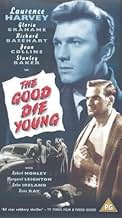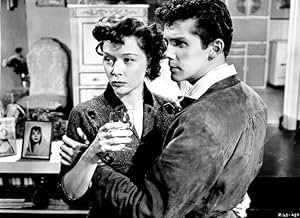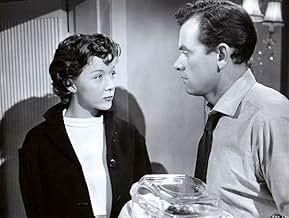What a sizzling lead performance in this superb British noir film by Larry Harvey! And what a terrible irony in the title, since Larry died at the age of only 45 in 1973. I remember him so well on the day walking in Hampstead with his little daughter Domino that he told me he was dying of stomach cancer. I asked him if he were certain, if there were not something 'they could do', but he merely looked at me with his ironical smile, a resigned one, and said no, he was dying. His nonchalance did not desert him. He shrugged it off sadly but with his ingrained insouciance. His reaction to his own imminent demise had no self-pity in it, but was full of pathos, as he regretted that he would not be able to watch Domino grow up. Alas, she too has now gone. He also worried about what would happen to Paulene, who is still as glamorous as she was then. But how sadly some meet their ends. Gloria Grahame, who also sizzles in this film, only lived to 58, and Stanley Baker only made it to 48. So yes, the good die young. But Joan Collins, ostensibly only 21 at the time (but already in her ninth feature film role!), is still with us and currently working on her 119th film! This film, brilliantly directed by Lewis Gilbert (and I noted that Jack Clayton, himself later to be such a brilliant director, is credited here as Associate Producer), is a terrific psychological study of how a group of desperate men can come together to commit a crime which they would otherwise never commit. Their individual stories are all fully sketched by a cast of wonderful pros. The four men are Richard Baseheart, John Ireland, and Stanley Baker, led by the mischievous, amoral, and as it turns out, probably psychotic, Larry Harvey, as the character known as 'Rave'. The devilish, pathological scheming of 'Rave' is brilliantly shown, and in the scenes towards the end of the film, Larry is positively terrifying. Robert Morley has a brief look-in which he slightly overdoes, but then he always had a propensity to overact, especially with the excessive widening of his eyes at crucial moments. Gloria Grahame does a wonderful job of playing a lascivious, 'gorgeous pouting', totally amoral movie starlet married to the long-suffering John Ireland. Ireland doesn't know whether he wants to kiss or to strangle her, as she is so exasperating but also so irresistible. And it was not only Ireland who found her so, but a large part of the Western world. Gloria Grahame certainly had 'that something', and more besides. The most polished performance in the film is probably that by Margaret Leighton, who later married Larry in 1957 (they divorced four years later). In the film she anticipates later true events by playing Larry's older wife. She is so insouciant and acts with such effortless ease that it is like watching olive oil coat the lens. In between Margaret Leighton's arched eyebrows there lurked a great deal of intelligence, a fine sense of humour, and an appreciation of irony. The stories behind the individual characters in this film are harrowing, and Joan Collins as an emotional prisoner of her harridan mother is particularly typical of the time. In those days, girls really did feel unable to leave their mothers and were easily emotionally blackmailed by them, whereas today the young are so indifferent to lasting attachments that a parent is merely another avatar in a video game, to be tossed aside when convenient. The central character remains the spoilt, narcissistic, pleasure-loving and wholly irresponsible 'Rave', who suffers from that condition known to psychologists as 'infantile omnipotence', and who reacts to the word 'No!' with a violent tantrum. The botched burglary and its aftermath is painful to watch, but I dare not say whether any of the vexed situations which drove the participants into it are resolved, for that would give away too much. Certainly, this is one of the finer British efforts in this genre during the 1950s.

























